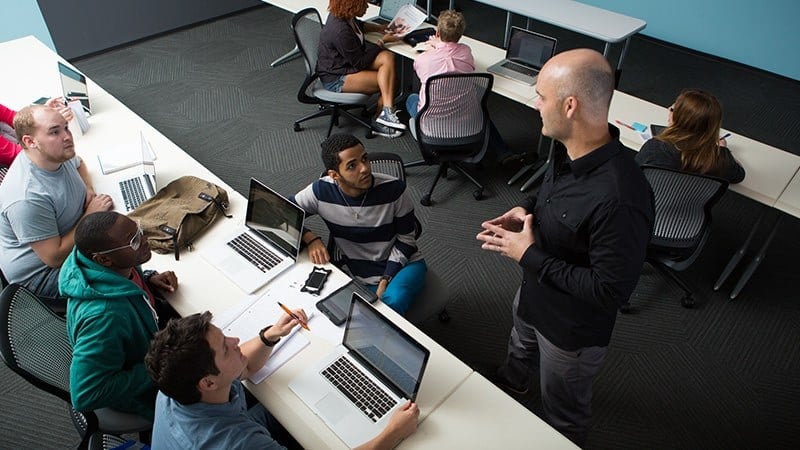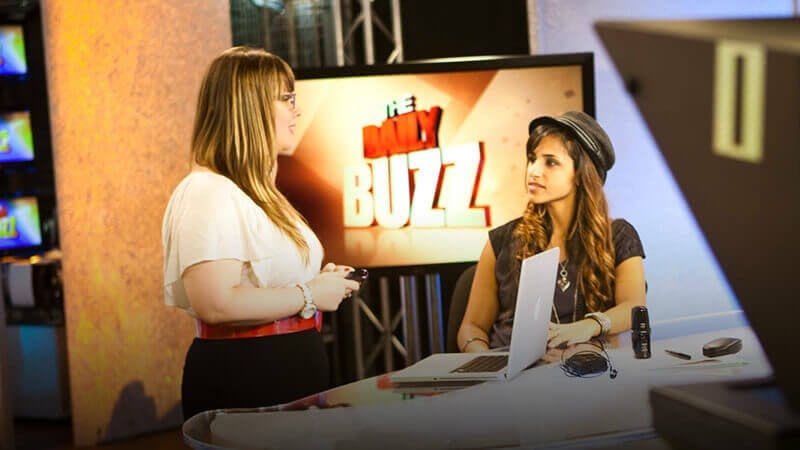Career Information
Pro Tips for Getting a Great Interview
Journalists spend most of their time talking to people – and it’s from these people that great content emerges. Good stories aren’t full of boring, useless quotes; they’re full of quotes from sources that reveal critical information, convey emotion and opinion, and effectively deliver the story the journalist sets out to tell in the first place.
“To me, the definition of a good interview is one that answers yes to this question: ‘Did you get all of the information you need?’” says Jeff Sharon, a former broadcast journalist, producer, and on-air anchor. “If the answer is no, you either have to go back or go ask someone else.”
As a course director in Full Sail University’s New Media Journalism Master’s program, Sharon discusses the art of the interview with his students frequently. Below, his interview pro tips.
Prepare ahead of time.
There’s no set amount of time a journalist should spend preparing for an interview, but Sharon recommends “as much as humanly possible.” Journalists should strive to know as much as possible about the person they’re about to interview.
“You want an interview with a person you've never met to look and sound like you've known each other for years,” says Sharon. “Know your quotes, your backing data, and the sources for each. That way, if someone says, ‘I didn't say that,’ you can say, ‘Yes, you did, in the December '99 issue of Newsweek you said...’ Nothing is more powerful than one's own words in context.”
Write down questions, but leave time for follow-ups.
Always have a list of questions ready, but definitely go off script if the conversation veers in a different direction. “I always write down my questions to prevent my inevitable forgetfulness, but I keep room on my notepad for follow-ups,” says Sharon.
Use a recorder.
Always record the interview, says Sharon. (Of course, journalists should let the source know that they are being recorded): “Accuracy, accuracy, accuracy,” he says. “If they call you the day after the story comes out and say, ‘Hey, I didn't say that,’ you can say, ‘Oh yes you did - And here’s the tape.’ Handwritten notes are never enough.”
Keep it conversational.
Journalists need to make their interview subjects feel comfortable enough to want to share with them. “Call the person beforehand and introduce yourself,” says Sharon, who teaches Digital News Production and New Media Publishing & Distribution in Full Sail’s New Media Journalism Master’s program. “Don't give away the questions, but be general about what you're talking about. Find something you have in common, which is where that research and prep comes in handy. And be nice - they're giving you their time for free!”
Be aware of your limits.
Be cognizant of how much time an interviewee has. If there’s only 30 minutes scheduled for the interview, be sure to pad in extra time for those inevitable follow-up questions.
“You may have to prioritize your questions if you have a limited time, so don't dilly-dally,” says Sharon. “The less time you have, the more important it is that you get to the point.”
Tips for conducting successful interviews is one of the many topics explored by students in the New Media Journalism Master of Arts degree program at Full Sail University. Click here to learn more about Full Sail’s accelerated online programs, and get started on your path to a master’s degree today.
Whether you’re ready to apply or just want to learn more about Full Sail University, our Admissions Representatives are here to help. Call us or request more information.
Keep Exploring
- Recording Arts
- Business Intelligence
- Emmys
- FSOA
- Campus
- Scheduling
- Instructional Design & Technology
- Information Technology
- What's Your Job?
- Real-World Experience
- Game Design
- Digital Marketing
- Digital Cinematography
- Sports Management
- Show Production
- Game Business & Esports
- Game Art
- Hall of Fame
- Career Development
- Educators
- Simulation & Visualization

